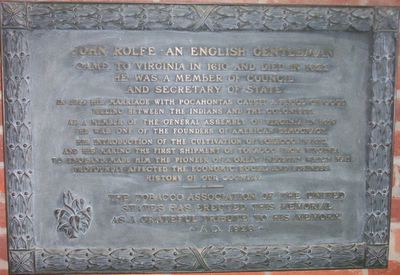America's commercial involvement with tobacco was the economic salvation of the struggling English colony at Jamestown. The person credited with this historic event was an Englishman and a Jamestown colonist, John Rolfe.
In May 1609, John Rolfe and his wife left England on the sailing ship, Sea Venture, bound for Jamestown. The Virginia Company, founded by investors, had financed and sponsored the English colony founded at Jamestown two years earlier. The Company expected the colonists to start industrial enterprises in Virginia that would return profits to the Company. Along the way, the Sea Venture ran aground on a reef off the Bermudas, but the entire crew of 150 safely reached shore in the ship's boats.
The colonists found Bermuda to be a hospitable place with sufficient food. In the following months, they built two smaller ships from cedar trees and salvage. By May 1610 the two ships, aptly named the Patience and the Deliverance, were ready. The ships reached Jamestown after ten days sailing. While on Bermuda, John Rolfe's wife had given birth to a daughter who was christened with the name Bermuda, but the child died there. Rolfe's wife also died, probably soon after they reached Jamestown.
The tobacco John Rolfe found growing near the Jamestown settlement was a strong leaf described by the colonists as "poore and weake, and of byting tast." In 1612, just two years after his arrival in Jamestown, Rolfe planted the first crop of a milder tobacco from seeds acquired from the Spanish colonies of Trinidad and Caracas. This marriage of the perfect soil with the perfect seed would later produce a bounty far more valuable than all the gold in America.
The first shipment from Rolfe's farm went to England in 1613. Although only a few hundred pounds, it was recognized by London merchants immediately for its possibilities. They demanded more. At the same time, the settlers saw that exporting tobacco was the only way to ensure the survival of their colony. The English had previously failed in four attempts to plant a permanent colony in the New World. Jamestown, the fifth attempt, was a success because of the commerce in tobacco.
It is worth noting that Rolfe's tobacco was not like the tobacco as we know it today. Although it was far superior to the native leaf, the heavy, strong product would most closely resemble the coarsest, darkest type of chewing tobacco now sold. History books give most of their attention to Rolfe's 1614 marriage to Pocahontas. This event brought him more fame in England than his experiment with a milder form of tobacco.
Now nearly 400 years later, it is time to recognize Rolfe and his tobacco for their heritage in shaping the course of events that led to American Revolution and the foundation of a great nation. Later in this blog on our national heritage, the story will be told of the compassion of Pocahontas in saving the Jamestown colonists from starvation and the wrath of her father.

